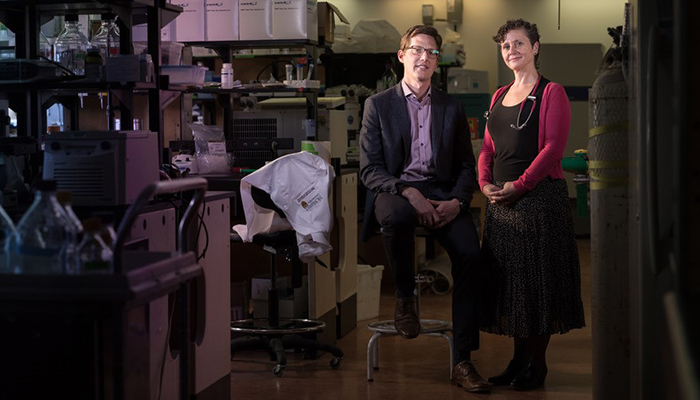New McMaster research centre zeros in on metabolism, obesity and diabetes

McMaster University is growing its commitment to addressing the epidemic of obesity and related health consequences with the establishment of the Centre for Metabolism, Obesity and Diabetes Research (MODR).
The centre is focused on translating world-leading basic science into clinical practice to improve the diagnosis, prevention and treatment of metabolic diseases in children and adults.
Two renowned McMaster researchers, Katherine Morrison and Gregory Steinberg, are serving as its co-directors.
“We want to use our multidisciplinary expertise, ranging from cellular systems to patient populations, to develop new preventative and treatment strategies to help people with chronic metabolic diseases,” said Morrison, professor in the Department of Pediatrics at McMaster and a pediatric endocrinologist with Hamilton Health Sciences.
Morrison and Steinberg have led the Metabolism and Childhood Obesity (MAC-Obesity) research program for the past six years. The new centre is a progression of MAC-Obesity based on its growth and success.
The scope of MODR is expanding to include research on obesity and adverse health consequences across the life span – from fetal life, through childhood and into adulthood.
A team of researchers and clinicians from McMaster and Hamilton Health Sciences will work under the umbrella of MODR. These researchers represent such disciplines as pediatrics, medicine, obstetrics and midwifery with research interests in diverse fields including obesity, diabetes, cardiovascular disease, gastrointestinal disorders and cancer.
“The MODR researchers’ expertise, complemented by state-of-the-art equipment, unique genetic models, and platforms for studying metabolism makes them world-leaders in biomedical discovery,” said Steinberg, professor in the Department of Medicine at McMaster and the Canada Research Chair in Metabolic Diseases.
Obesity, Type 2 diabetes and non-alcoholic fatty liver disease are prevalent conditions that impact more than 25 per cent of adults in Canada.
The direct cost on the Canadian healthcare system is estimated to be more than $30 billion annually, with real costs much higher given the increased incidence of cardiovascular disease, associated cancers and other diseases.
“Adding to these challenges of the healthcare system is that the prevalence of overweight and obesity among Canadian children is now 32 per cent,” said Morrison. “This, together with the recognition of the influence of obesity in childhood on increased disease and death across the lifespan, has resulted in urgent calls to action.”
A specific focus of the MODR team is discovering the biological drivers leading to energy imbalance and metabolic disturbance; understanding the mechanisms for mediators of energy balance such as nutrient intake and physical activity, and evaluating and treating associated adverse health outcomes.
“While weight loss is known to be an effective treatment for alleviating some of these chronic metabolic diseases, current treatment options such as dietary interventions and exercise unfortunately have limited long term success,” said Steinberg. “Discovering and implementing new, effective strategies to reduce the impact of these diseases is guiding the work we are doing at MODR.”
Paul O’Byrne, dean and vice-president of the Faculty of Health Sciences, said the evolution of the MAC-Obesity research program into an established centre is a testament to the calibre of work being conducted at the university.
“The research program led to date by Dr. Morrison and Dr. Steinberg has produced many important findings, and this research will be further advanced by the formal creation of the centre,” said O’Byrne.
“We anticipate more essential work ahead, as the combination of basic scientists and clinicians results in a holistic approach in the hunt for more answers to help address this pressing health issue.”
2018, News Article